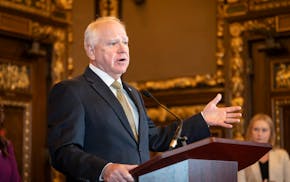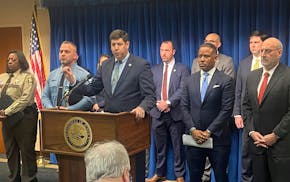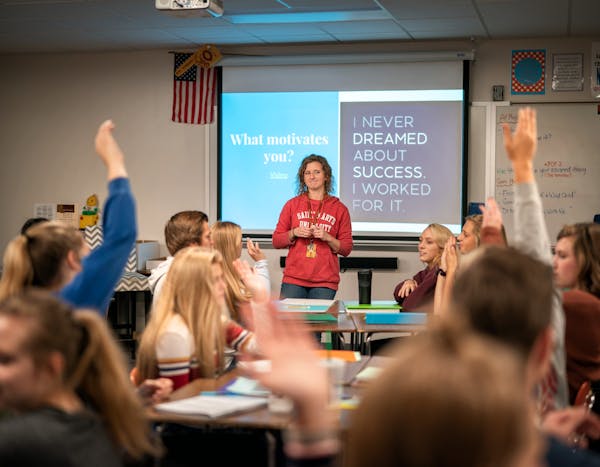Sixth-grade U.S. history teacher Andrew Waller flashed a photo of a slice of pizza covered in pineapple chunks onto the screen. The class of preteens blurted-out opinions of the controversial pizza topping.
Waller quieted the room and launched a conversation about respectful disagreement among the preteen Chaska Middle School East students.
"We're going to talk about issues like immigration, the role of government and what presidents should or should not do," he said. "I don't know if you've noticed, but adults argue about this stuff all the time ... so we need to come up with some rules."
In today's political climate, history and civics teachers are tasked with finding strategies to teach controversial topics without letting their class devolve into partisan debate.
Minnesota has revamped and boosted its civics and social studies requirements in recent years. But even adults can't always agree on what should be taught or allowed in classrooms, making schools a stage for political and cultural clashes.
That has teachers — and several organizations who support them — brainstorming strategies, rules and lesson plans around civic discourse.
Next month, as part of the Minnesota Civics Summit, teachers can take a professional development workshop all about fostering "challenging, respectful conversations in class about important, sometimes divisive, issues."
"What we are called to do in this youth civic engagement space is try to create situations where kids get the tools, the knowledge and ultimately the motivations to do it differently than what we see in the public right now," said Amy Anderson, the leader of the upcoming professional development session and the executive director of the YMCA's Center for Youth Voice.
Respectful conversation in the classroom, Anderson said, involves a way of talking from personal experience. It encourages students to ask questions out of genuine interest, with the goal of gaining perspective.
"We say at the beginning, you might leave the class or the topic never changing your mind about anything," she said, "but we think you will have a deeper understanding of why your classmate might feel differently than you."
Waller's lesson on perspective in Chaska included a series of "ambiguous images" — the types of drawings that can be interpreted to show different things, depending on how you look at them.
At one table, a group of girls spent several minutes trying to help a classmate see an old woman's face in a black-and-white drawing that can also be seen to depict a young woman turning away.
"Ok, wow," the girl said finally. "I see it! I can see it both ways."
Controversial but relevant topics
In January, the Center for Youth Voice hosted the 71st annual Youth in Government conference, where more than 1,400 students from across the state took on roles as legislators, lobbyists, lawyers, judges, justices and journalists to spend four days running a model state government.
Steve Holt, a history teacher at Fridley High School, brought more than 80 students to the conference this year. The student-led experience, he said, is proof that students want to be engaged in civic discussion — and they can do it with teens from the other side of the state and the other side of the political spectrum.
"I do think it's a little harder these days, but the hope has always been to get them to investigate their own perspectives while understanding the facts and history," he said. "It's about teaching lifelong learners who can learn from each other."
Despite the challenges of navigating controversial topics in the classroom, Holt said there's one benefit to having the government dominate the news:
"I rarely get kids asking me, 'Why do we have to learn this?'" he said. "They see the relevancy."
The era of distance learning amid the COVID-19 pandemic brought new attention — and scrutiny — to schools, teaching methods and curriculum. Subsequent disputes have also involved cultural divides over library books and even classroom posters.
In Minnesota, that coincided with an effort to create new social studies standards. After a fraught and years-long process, those standards, which include an ethnic studies component that proved controversial, go into effect for the 2026-2027 school year.
'The kids enforce those rules'
At Chaska East, Waller had students identify what classroom rules they wanted in place, picking their priorities from a list that included "be curious," "listen with respect," and "be aware of your judgments."
"I think it's good to focus on other ideas other than your own," sixth-grader Jack Cleveland said before opening up his laptop to read an assigned article about immigration. "It can even help you learn more about your own ideas."
Down the hall, Chaska Middle School civics teacher Katie Rotunda also has classroom rules for political discussion:
Raise your hand to speak and stand by what you say. When referring to a politician, use their last name or official title — first names or nicknames are not allowed. And cite your sources, even if it's your mom or your grandpa.
"Honestly, the kids enforce those rules more than I do," she said. "They seem to really understand the purpose behind them."
Rotunda and Waller both spend a lot of time in class teaching students about where to find information and how to analyze it for bias.
Traditionally, Rotunda said she was taught to present students with objective, nonbiased information from sources like reference books. But she's since changed course, focusing more on helping students learn how to identify the perspective of an article, book or video.
"It's about making sure we seek info to help us form opinions, not just validate them," Rotunda said. "Building those habits at this age is really important."
Waller said his students are sometimes more conscious than adults about staying sensitive and respectful, which may be a response to the political era they've grown up in.
"Current politics is all they've ever known," Waller said. "I look at today's political climate and in my mind, I'm like, 'This isn't normal.' But this is their normal."
Seventh-grader Alonna Hammond, is a shy and quiet student in one of Rotunda's most boisterous civics periods. But Hammond loves the class, she said, because it's a time when she feels heard. Without rules about respect, politics can be uncomfortable to discuss, Hammond said, even among family.
"It's always Republicans vs. Democrats, red vs. blue," she said. "But politics and government affect everyone. So we have to talk about it. But we have to do it in a respectful, mature way."

Accomplished climber, photographer who recently moved from St. Paul missing on mountain

Walz: State had no advance notice of federal raid in Minneapolis

DOGE cuts federal money for upgrades at Velveeta plant in New Ulm

Five members of Minneapolis Highs street gang found guilty of racketeering conspiracy

